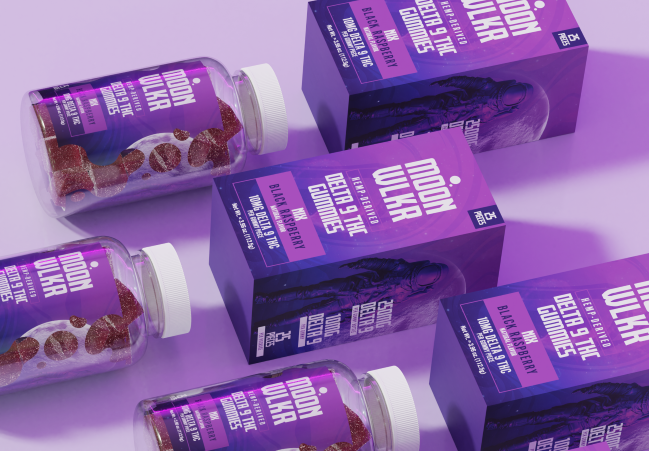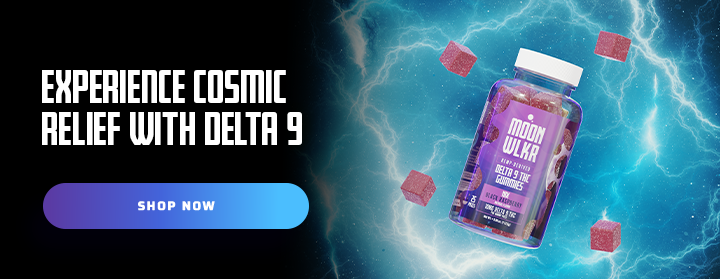In the realm of mental health, individuals often find themselves exploring various avenues in search of relief from the challenges posed by conditions like depression.
One emerging topic of interest is the potential use of Delta-9 THC, a cannabinoid found in cannabis, particularly in the form of gummies.
While the conversation around alternative treatments is evolving, it’s crucial to approach the subject with a mindful and informed perspective.
Depression, a complex and often debilitating mental health condition, affects millions worldwide. Traditional treatments, including therapy and medication, play a vital role in managing the disorder. However, as societal attitudes toward cannabis shift, some individuals are exploring the potential benefits of Delta-9 THC for alleviating symptoms of depression.
Join us on this exploration as we delve into the potential of Delta-9 gummies, keeping in mind the importance of informed choices and the guidance of healthcare professionals in the pursuit of mental health.
What is Delta-9?
Delta-9 refers to delta-9-tetrahydrocannabinol (THC), which is a psychoactive compound found in the cannabis plant. THC is one of the many cannabinoids present in cannabis, and it is primarily responsible for the plant’s mind-altering effects. When people refer to Delta-9 THC, they are specifically talking about the most well-known and abundant form of THC in cannabis.
Delta-9 THC interacts with the endocannabinoid system in the human body, particularly with the CB1 receptors in the brain and nervous system. This interaction is what produces the characteristic euphoric or “high” feeling associated with cannabis use.

Understanding Depression
Depression, a profound mental health disorder, extends beyond mere sadness, encompassing emotional, cognitive, and physical symptoms. Emotional distress, cognitive challenges, and physical manifestations define this condition, impacting daily life significantly. Biological factors, environmental influences, and psychological aspects contribute to its causes, making depression a complex interplay of various factors.
The impact of depression is far-reaching, affecting social interactions, occupational performance, and physical health. Individuals experiencing depression often face social withdrawal and occupational difficulties, emphasizing the need for comprehensive support systems.
Recognizing depression involves understanding its nuanced nature and encouraging those affected to seek support from mental health professionals, friends, or family.
Breaking the stigma around mental health is crucial for fostering open conversations and creating a supportive environment. If you are having invasive and/or depressive thoughts and need help, please click here to visit the Samaritans website.
In the following sections, we’ll explore different approaches, including the potential role of Delta-9 THC, in addressing and managing the impact of this intricate mental health condition.
How Does Delta-9 Have the Potential to Help with Depression?
Delta-9 THC has garnered attention for its potential role in alleviating symptoms of depression. While research is ongoing and the relationship between cannabinoids and mental health is complex, some studies suggest that Delta-9 THC may influence mood regulation through its interaction with the endocannabinoid system.
1. Neurotransmitter Modulation
Delta-9 THC interacts with CB1 receptors in the brain, influencing neurotransmitter release. This modulation may impact the balance of neurotransmitters related to mood, such as serotonin and dopamine. When dopamine is released in the brain, it induces a fleeting sense of pleasure. In contrast, serotonin, although akin to dopamine, generates a sustained sensation of happiness or overall well-being.
2. Elevated Mood and Relaxation
Some users report feelings of euphoria and relaxation after consuming Delta-9 THC. These mood-enhancing effects could potentially contribute to a sense of well-being for individuals experiencing depressive symptoms.
Additionally, Delta-9 THC has been linked to a calming effect, reducing stress and anxiety levels for some individuals. The compound induces a state of relaxation, both physically and mentally, with changes in sensory perception enhancing the overall sense of well-being.
Take a look at these reviews from Moonwlkr from satisfied customers
Amazing for Pain and Depression
I’ve been smoking for a long time for my chronic pain and depression, and this particular edible works WONDERS. Within 30 minutes I’m pain free, and on a 4 hour ride of relaxation and euphoria. I will definitely be buying again!
Jaxon K.
Delta 9 THC Gummies — Pink Lemonade
Excellent Effect and Flavor
One or two gummies is all I need for all-day relaxation and focus. I’m on medication for generalized anxiety-disorder and depression, so I have a hard time focusing my attention for an extended period of time. I used to love to read, and these gummies give me the focus needed to enjoy reading once again. I highly recommend these gummies.
Chris R.
D8:D9 Gummies — Blueberry Lemonade
3. Preliminary Research Findings
Some studies indicate a possible connection between cannabinoids and enhanced mood. Nevertheless, more comprehensive research is necessary to determine the effectiveness and safety of Delta-9 THC specifically for treating depression. Studies are ongoing but initial research remains hopeful.
4. Individual Variances
Responses to Delta-9 THC’s mood-elevating and relaxing effects can vary among individuals. Factors such as dosage, frequency of use, and individual differences in neurochemistry contribute to the variability in how people experience these effects. Just like more traditional treatments for depression, what works for one individual may not work for another.
5. Caution and Moderation
While some users may find relief from stress and an improvement in mood with Delta-9 THC, it’s essential to approach its consumption with caution. Moderation is key, and individuals should be mindful of their tolerance, potential side effects, and the legal implications of cannabis use in their jurisdiction.
Other Benefits of Delta-9
Delta-9 THC, a prominent cannabinoid found in cannabis, presents a range of potential benefits. We have discussed the common report of elevated mood, feelings of euphoria, and stress reduction after consuming Delta-9 THC.
Additionally, Delta-9 THC has demonstrated anxiolytic properties, potentially reducing stress and anxiety levels. Some users also experience pain relief, making it of interest in managing chronic pain conditions.
The perceptual changes induced by Delta-9 THC, including altered sensory perception and time distortion, may enhance creativity and sociability in certain individuals. Furthermore, its appetite-stimulating effects can be beneficial for those experiencing appetite loss due to medical conditions or treatments.
What are the Possible Risks of Delta-9?
While Delta-9 THC offers potential benefits, it’s crucial to be cognizant of associated risks. The psychoactive nature of Delta-9 THC can induce perceptual changes, potentially leading to anxiety or paranoia, especially in individuals predisposed to mental health disorders. Additionally, cognitive functions like memory and coordination may be temporarily impaired, so caution is advised when considering engaging in activities requiring mental acuity while under its influence.
Dependency and addiction are potential concerns with regular and excessive use, as individuals may develop tolerance over time. Legal implications vary globally and within jurisdictions, necessitating awareness and adherence to local regulations. Health risks, particularly related to respiratory health from smoking or inhaling Delta-9 THC, should be considered, and pregnant women are advised to avoid its use due to potential developmental risks. Consulting healthcare professionals before incorporating Delta-9 THC, ensuring its safe use within an individual’s unique health context.
What is the Dosage of Delta 9 for Depression?
Determining the appropriate dosage and usage of Delta-9 THC for managing depression is a nuanced process that requires careful consideration and individualized approaches:
1. Start Low and Go Slow
Initiate with a low dosage and gradually increase, allowing the individual to gauge their response and tolerance to Delta-9 THC. Starting with a minimal amount helps minimize the risk of adverse effects.
2. Individual Variations
As mentioned prior, responses to Delta-9 THC vary among individuals due to factors such as body weight, metabolism, and overall health. Tailoring dosage based on individual characteristics is crucial for optimizing benefits while minimizing risks.
3. Monitoring and Adjustments
Regularly monitor the effects of Delta-9 THC on mood and overall well-being. Adjust dosage as needed based on individual responses and consult healthcare professionals for guidance.
4. Integration with Comprehensive Approaches
Delta-9 THC should be viewed as part of a comprehensive approach to managing depression. Combining it with therapeutic interventions, lifestyle changes, and other evidence-based treatments may enhance overall efficacy.
5. Consultation with Healthcare Professionals
Before incorporating Delta-9 THC into a depression management strategy, individuals should consult with healthcare professionals. Professionals can provide personalized guidance, considering existing treatments, potential interactions with medications, and individual health profiles.
So, Can Delta-9 Help with Depression?
The potential of Delta-9 THC to help with depression is a complex and evolving topic. While some users report mood enhancement and relaxation after consuming Delta-9 THC, and there is limited research suggesting a link between cannabinoids and mood improvement, more rigorous studies are needed to establish its efficacy and safety specifically for depression.
Moonwlkr already released a blog post discussing the use of Delta-9 and its effect on mood, which you can check out here.
Delta-9 THC interacts with the endocannabinoid system, influencing neurotransmitter release, including dopamine and serotonin. This neurochemical interaction may contribute to the characteristic euphoria and relaxation associated with THC consumption.
However, individual responses vary, and factors like dosage, frequency of use, and individual biochemistry play a role. It’s crucial to approach the use of Delta-9 THC for depression with caution.
Potential risks should be carefully considered, however some individuals may find fantastic benefits to using Delta-9 as an aide to treating their depression.
If you are interested in trying it for yourself, click here to shop our Moonwlkr products.





